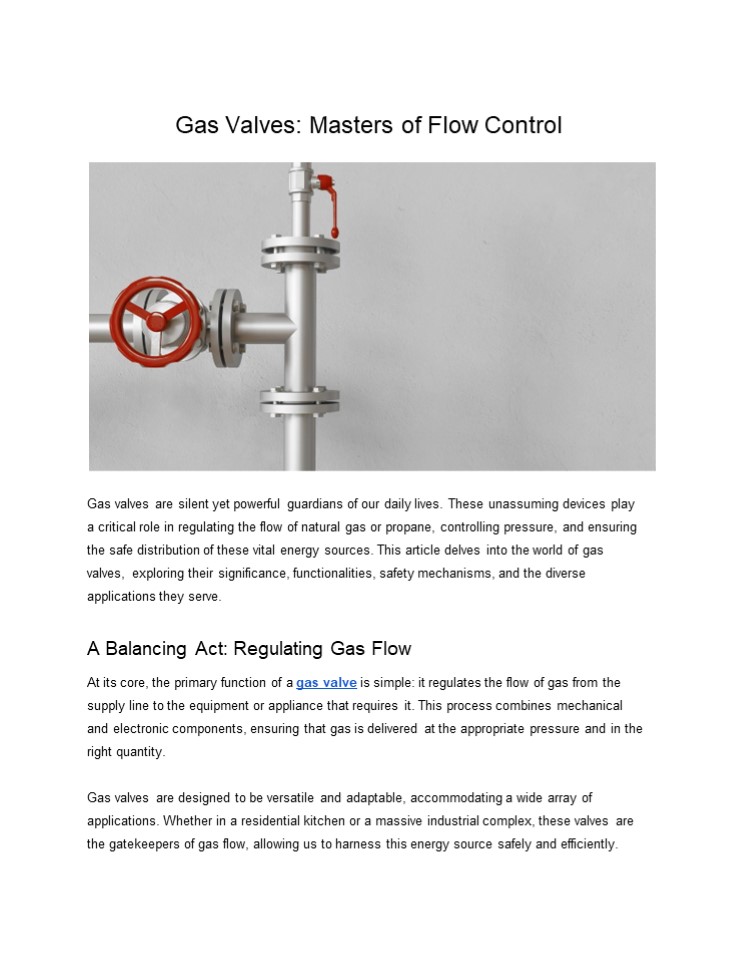Gas Valves: Masters of Flow Control PowerPoint PPT Presentation
Title: Gas Valves: Masters of Flow Control
1
Gas Valves Masters of Flow Control
Gas valves are silent yet powerful guardians of
our daily lives. These unassuming devices play a
critical role in regulating the flow of natural
gas or propane, controlling pressure, and
ensuring the safe distribution of these vital
energy sources. This article delves into the
world of gas valves, exploring their
significance, functionalities, safety mechanisms,
and the diverse applications they serve. A
Balancing Act Regulating Gas Flow At its core,
the primary function of a gas valve is simple it
regulates the flow of gas from the supply line to
the equipment or appliance that requires it. This
process combines mechanical and electronic
components, ensuring that gas is delivered at the
appropriate pressure and in the right
quantity. Gas valves are designed to be
versatile and adaptable, accommodating a wide
array of applications. Whether in a residential
kitchen or a massive industrial complex, these
valves are the gatekeepers of gas flow, allowing
us to harness this energy source safely and
efficiently.
2
Safety First Built-In Protections The importance
of safety in gas-related systems cannot be
overstated. Gas valves come equipped with an
array of safety features to prevent leaks and
ensure the protection of people and property. One
of the most critical safety mechanisms is the
built-in shut-off valve. This valve can swiftly
halt the flow of gas in the event of a
malfunction, irregular pressure, or emergencies,
averting potential disasters. Gas valve safety
extends beyond emergency shut-offs. Pressure
regulators are integral components, maintaining a
consistent gas pressure throughout the system.
This pressure stability is crucial for the proper
functioning and longevity of gas-powered
appliances. Any variations in gas pressure can
negatively impact performance, making these
regulators essential. Diverse Applications From
Home to Industry Gas valves are not
one-size-fits-all they come in various types and
sizes to meet the demands of different
applications. In residential settings, these
valves find their place in stoves, water heaters,
and furnaces. Meanwhile, industrial facilities
rely on more complex and robust gas valve systems
to power machinery, generators, and various
industrial processes. The adaptability of gas
valves allows them to cater to both everyday
household needs and heavy-duty industrial
requirements. Embracing the Digital Age Smart
Gas Valves Advancements in digital technology
have given birth to the era of smart gas valves.
These sophisticated devices can be controlled and
monitored remotely, offering an unprecedented
level of convenience and control. Smart valves
not only provide real-time data on gas
consumption but can also detect anomalies in the
gas supply, offering enhanced safety and
efficiency. In Closing Guardians of Our
Energy In the grand scheme of our daily lives,
gas valves might seem like small, inconspicuous
devices. However, their significance in
controlling the flow of natural gas and propane
cannot be
3
overstated. They are integral to ensuring the
safe and efficient operation of a wide range of
appliances and industrial equipment. With ongoing
technological advancements, gas valves continue
to evolve, contributing to greater energy
efficiency and safety in our homes and
industries. These quiet guardians stand as a
testament to the marvels of engineering that
shape our modern world.

